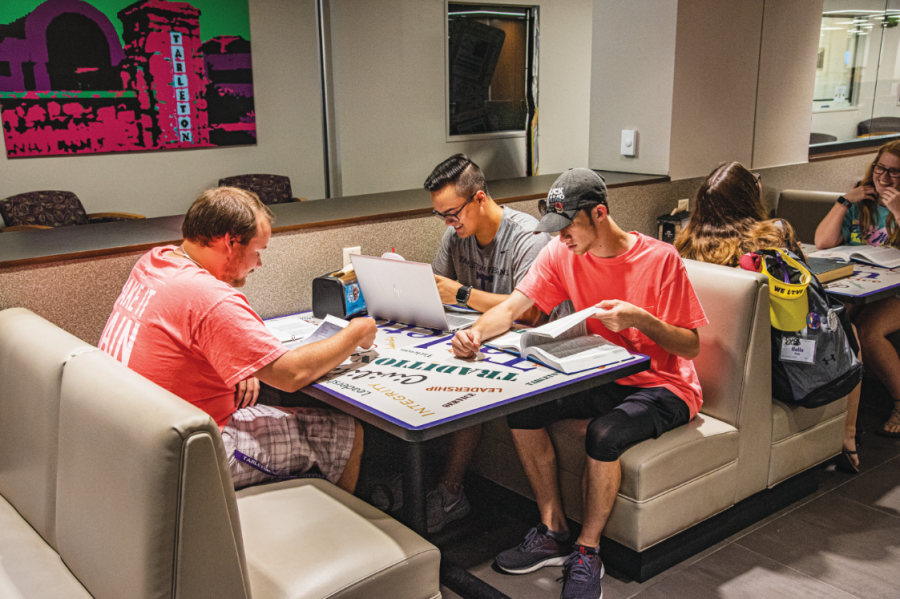Advice for all college students
Austin Sikes, Trent Higgins and Elijah Perry Imbong studying on the main floor of the library near Study Grounds.
Go To Class
New students often hear that in college, “you can go to class anytime you want.” this is far from being true. Some classes may seem less interesting than others, but college is not for entertainment. Experienced students often say that the more time they spend in class, the less time they need to study outside of class.
Budget Time
Have a social life, but plan your study time properly. Do not begin to study for a test or write a paper the night before either is due. Read syllabus early for dates and note them on a calendar. (I set an alarm on my for all major due dates two days before its due). Remember, sleep is also necessary, so budget for that as well.
Being a Student Is a Full-Time Job
You can’t work hard only one day a week and earn acceptable grades. Look at collegiate life as a full-time career for the present. Focus on good academic habits, social skills, and balancing priorities. If you do really need a job working on campus is a great way to earn money and have a work schedule that fits with your class schedule.
Become Part of University Life
Becoming part of the campus community is just as important as going to class, writing papers, and taking exams. Don’t join every group, but be selective and participate in activities that will offer balance to your life. Take advantage of the variety of university experiences.
Be Patient with Yourself
You will make errors or mistakes during your collegiate career. Please be assured that you are not doomed. When you realize, or even think, you have goofed, set out to correct it.
Make Your Own Decisions
Seeking advice is always nice. Trying to play it safe and avoid making decisions can lead to as many problems as making uninformed or risky choices. Weigh options and gather as much information as possible. Accept responsibility for your decisions.\
Know Your Academic Situation Before the Withdraw Period
If you have a question or concern about how you are doing in a class, go to the professor and discuss it. Keep yourself informed and record all grades received for each assignment. Read each syllabus carefully, and pay attention to the weight of all assignments as they determine the final grade in each course. Keep all grades updated.
Learn To Communicate In the Classroom
There are no dumb questions concerning subject matter. If you don’t know or don’t understand something, chances are several of your classmates don’t either. Learning to ask questions is a skill.
Safeguard Your Physical and Mental Well-Being
When exhausted, rest. Eat proper food and know when to relax. Plan exercise into your schedule. No one is going to thank you for working yourself into a frazzle or getting ill, let alone for staying up all night. It is amazing how many students demand their independence and simply do not know how to take care of themselves.
Accept Responsibility for Yourself and Your Behavior
If what you say and do is prompted by others, or if nothing is ever your fault because others “pushed” you, you cannot claim to be an adult, just an immature follower. You may think it’s all fun in games now but Tarleton does have a judicial affairs system for either academic slips or university policy.
Write Home
It may sound silly but parents and family can prove to be the best support service. Families honestly want to know how you are doing. They may not be able to do more than listen, but that act alone is essential to your well-being. Siblings, grandparents, and neighborhood friends are in your corner and want you to succeed. Let them share in your new life. What I did was mail a letter to my Grandma with my class schedule and told the day and time to call me at so we always have a time scheduled in the week to talk.







